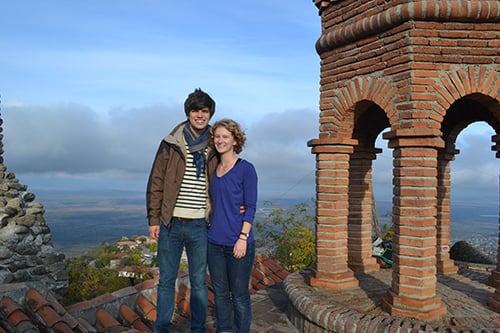Why inspired you two to teach ESL?
Duncan & Jennifer: We’re both pretty big nerds. We loved college and everything that came with it. We know we want to go back to school someday, but like many just-grads, we don’t know exactly what we want to study. Sometimes, and we’re being completely serious here, teaching ESL is the perfect way to buy yourself a couple of years to think about what comes next.
It’s not always easy, but it’s really a great deal. We’re getting paid to travel to amazing places and teach something we’re already good at. Most of the time, you don’t even have to jump through too many hoops to do so. Our application process wasn’t exactly painless, but we ended up in a great place.

Why did you choose Reach to Teach?
Duncan & Jennifer:The biggest hurdle throughout our job search was the fact that we were applying as a couple. It made everything complicated and we needed a program that was willing to work with us.
Sometimes, all you’re looking for is someone to make a genuine effort to get to know you. Everyone wants to be more than a number, and that’s never more true than when you’re looking for a job. A friend recommended Reach to Teach to us, and we sent an email outlining our situation. John Kellenberger, one of the Co-Presidents, called us personally and we talked on the phone for more than an hour that first night. This was after weeks of waiting on email after email from every other shadowy enterprise we were inquiring after. It was a breath of fresh air. By the end of the conversation, we knew we were working with the right people.
Please describe the application process/obstacles for couples wanting to teach abroad?
Duncan & Jennifer:The fact of the matter is that dealing with couples is a headache for every program. Some programs are willing to put up with it, but others aren’t, and pretty much every program that was even willing to look at our joint application had stipulations in their contract saying they would try to place couples together, but they weren’t willing to promise anything.
If you’re married, it becomes much easier, but we aren’t married yet. I still remember laughing when John jokingly asked us to get married just because that would make everything a whole lot simpler. But we didn’t want to rush a marriage for the sake of a job application.
Sometimes you just have to take a risk. We spent our first week in Georgia in Eastern Europe not knowing for sure whether we would be living in the same house or across the country from each other. That was scary, but at least we were ready for it.
Reach to Teach was with us every step of the way. They made sure we knew what we were getting ourselves into and worked with the program to make sure we had the best possible chances to be together. Everything worked out in the end!
Describe your day to day activities as teachers in Georgia.
Duncan & Jennifer: We’re kind of in the middle of nowhere, but not in a bad way. We live in a pretty small village in the wine-region in Eastern Georgia, and share a bedroom in our host-family’s house. We work every weekday, but the hours aren’t grueling. We have a total of 16 classes a week with 1stthrough 6th graders which we co-teach with a local teacher. The hardest thing about our experience has been not having our own place. Even when school is over for the day, we never really get a break from teaching. We have host-brothers and sisters to tutor and being foreigners in a small village like this is like being a celebrity; everyone wants a piece of us. But living with a host family comes with a lot of upside. It’s the best way to really experience a foreign culture and there is so much we would have missed without it.

How has this experience impacted your relationship?
Duncan & Jennifer: It's definitely a test, and not one to be taken lightly. Teaching abroad is an isolating experience; it really makes you appreciate your friendships. Living here as a couple definitely lessens that sting of loneliness, but you kind of end up having to be everything for your partner. You become each other’s confidants, practice partners, shoulders to cry on when one is desperately needed, and nurses when disease inevitably strikes. All of these responsibilities add up. It’s like being stuck in a canoe together; you have to be willing to work with each other, or the pressure can really start to break you apart.
But when it works, it’s the best. We get to grow together, see the world, and share this absolutely amazing experience.